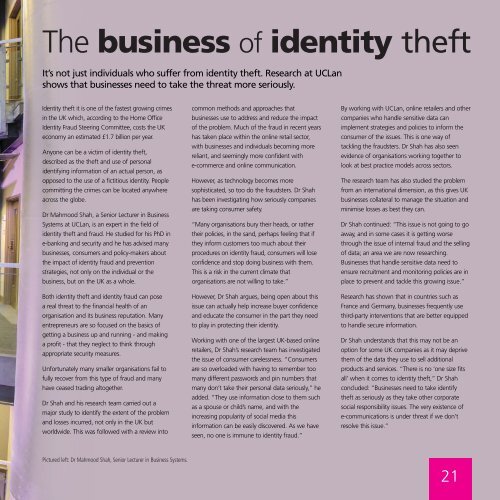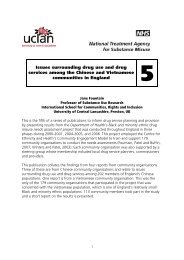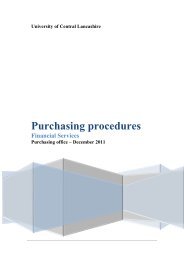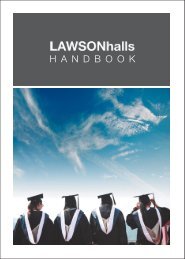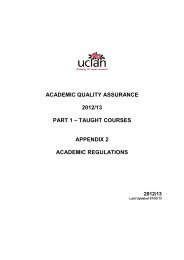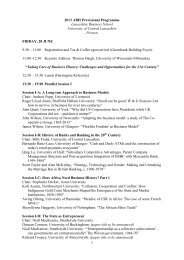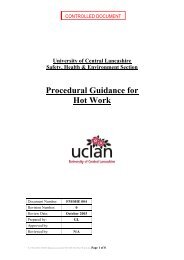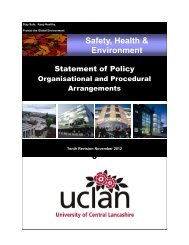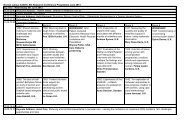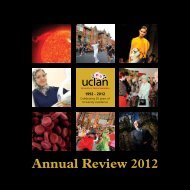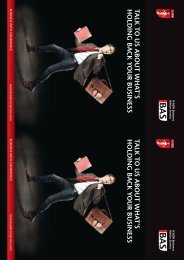Layout 2 - University of Central Lancashire
Layout 2 - University of Central Lancashire
Layout 2 - University of Central Lancashire
Create successful ePaper yourself
Turn your PDF publications into a flip-book with our unique Google optimized e-Paper software.
The business <strong>of</strong> identity theft<br />
It’s not just individuals who suffer from identity theft. Research at UCLan<br />
shows that businesses need to take the threat more seriously.<br />
Identity theft it is one <strong>of</strong> the fastest growing crimes<br />
in the UK which, according to the Home Office<br />
Identity Fraud Steering Committee, costs the UK<br />
economy an estimated £1.7 billion per year.<br />
Anyone can be a victim <strong>of</strong> identity theft,<br />
described as the theft and use <strong>of</strong> personal<br />
identifying information <strong>of</strong> an actual person, as<br />
opposed to the use <strong>of</strong> a fictitious identity. People<br />
committing the crimes can be located anywhere<br />
across the globe.<br />
Dr Mahmood Shah, a Senior Lecturer in Business<br />
Systems at UCLan, is an expert in the field <strong>of</strong><br />
identity theft and fraud. He studied for his PhD in<br />
e-banking and security and he has advised many<br />
businesses, consumers and policy-makers about<br />
the impact <strong>of</strong> identity fraud and prevention<br />
strategies, not only on the individual or the<br />
business, but on the UK as a whole.<br />
Both identity theft and identity fraud can pose<br />
a real threat to the financial health <strong>of</strong> an<br />
organisation and its business reputation. Many<br />
entrepreneurs are so focused on the basics <strong>of</strong><br />
getting a business up and running - and making<br />
a pr<strong>of</strong>it - that they neglect to think through<br />
appropriate security measures.<br />
Unfortunately many smaller organisations fail to<br />
fully recover from this type <strong>of</strong> fraud and many<br />
have ceased trading altogether.<br />
Dr Shah and his research team carried out a<br />
major study to identify the extent <strong>of</strong> the problem<br />
and losses incurred, not only in the UK but<br />
worldwide. This was followed with a review into<br />
common methods and approaches that<br />
businesses use to address and reduce the impact<br />
<strong>of</strong> the problem. Much <strong>of</strong> the fraud in recent years<br />
has taken place within the online retail sector,<br />
with businesses and individuals becoming more<br />
reliant, and seemingly more confident with<br />
e-commerce and online communication.<br />
However, as technology becomes more<br />
sophisticated, so too do the fraudsters. Dr Shah<br />
has been investigating how seriously companies<br />
are taking consumer safety.<br />
“Many organisations bury their heads, or rather<br />
their policies, in the sand, perhaps feeling that if<br />
they inform customers too much about their<br />
procedures on identity fraud, consumers will lose<br />
confidence and stop doing business with them.<br />
This is a risk in the current climate that<br />
organisations are not willing to take.”<br />
However, Dr Shah argues, being open about this<br />
issue can actually help increase buyer confidence<br />
and educate the consumer in the part they need<br />
to play in protecting their identity.<br />
Working with one <strong>of</strong> the largest UK-based online<br />
retailers, Dr Shah’s research team has investigated<br />
the issue <strong>of</strong> consumer carelessness. “Consumers<br />
are so overloaded with having to remember too<br />
many different passwords and pin numbers that<br />
many don’t take their personal data seriously,” he<br />
added. “They use information close to them such<br />
as a spouse or child’s name, and with the<br />
increasing popularity <strong>of</strong> social media this<br />
information can be easily discovered. As we have<br />
seen, no one is immune to identity fraud.”<br />
By working with UCLan, online retailers and other<br />
companies who handle sensitive data can<br />
implement strategies and policies to inform the<br />
consumer <strong>of</strong> the issues. This is one way <strong>of</strong><br />
tackling the fraudsters. Dr Shah has also seen<br />
evidence <strong>of</strong> organisations working together to<br />
look at best practice models across sectors.<br />
The research team has also studied the problem<br />
from an international dimension, as this gives UK<br />
businesses collateral to manage the situation and<br />
minimise losses as best they can.<br />
Dr Shah continued: “This issue is not going to go<br />
away, and in some cases it is getting worse<br />
through the issue <strong>of</strong> internal fraud and the selling<br />
<strong>of</strong> data; an area we are now researching.<br />
Businesses that handle sensitive data need to<br />
ensure recruitment and monitoring policies are in<br />
place to prevent and tackle this growing issue.”<br />
Research has shown that in countries such as<br />
France and Germany, businesses frequently use<br />
third-party interventions that are better equipped<br />
to handle secure information.<br />
Dr Shah understands that this may not be an<br />
option for some UK companies as it may deprive<br />
them <strong>of</strong> the data they use to sell additional<br />
products and services. “There is no ‘one size fits<br />
all’ when it comes to identity theft,” Dr Shah<br />
concluded: “Businesses need to take identify<br />
theft as seriously as they take other corporate<br />
social responsibility issues. The very existence <strong>of</strong><br />
e-communications is under threat if we don’t<br />
resolve this issue.”<br />
Pictured left: Dr Mahmood Shah, Senior Lecturer in Business Systems.<br />
21


